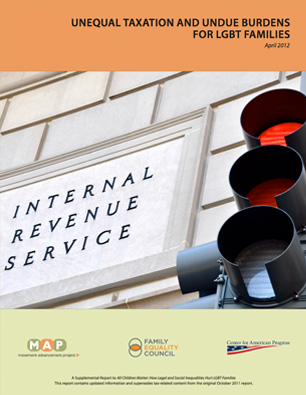The Bottom Line
Millions of American families led by parents who are lesbian, gay, bisexual or transgender (LGBT) face unequal and inflated tax burdens and tax filing so complicated even accountants cannot always advise them.
Unequal Taxation and Undue Burdens for LGBT Families provides a groundbreaking, in-depth look at the income tax inequities faced by LGBT families, illustrating how many tax exemptions, credits and deductions designed to help families ease the financial burdens of raising children are unavailable to families with LGBT parents. The report also documents how, because LGBT families are denied federal recognition of their marriages and denied joint filing status due to the Defense of Marriage Act (DOMA), they face higher taxes on family health insurance benefits and additional gift and estate tax liability—and must misrepresent and “carve up” their families when filing taxes with the Internal Revenue Service (IRS). Unequal Taxation and Undue Burdens for LGBT Families also outlines recommendations for amending and repealing archaic and discriminatory tax laws that harm children who have LGBT parents.
Co-authored by the Movement Advancement Project, Family Equality Council and the Center for American Progress, this companion study to All Children Matter: How Legal and Social Inequalities Hurt LGBT Families extends that report’s examination of how antiquated laws and stigma harm children living in LGBT families in America.
Unequal Taxation and Undue Burdens for LGBT Families Download
Recommended citation:


